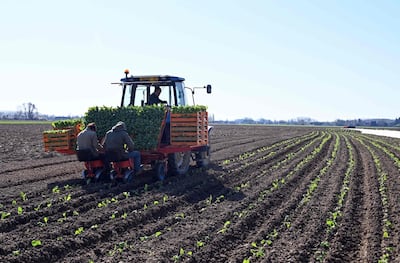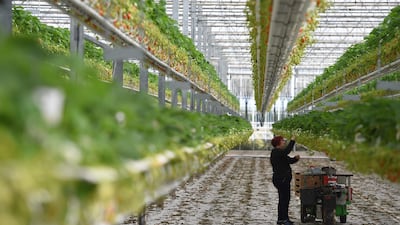Farmers across Europe are making a rallying call for an “agricultural army” as thousands of crops face being lost due to a coronavirus staffing crisis.
Stricter border controls and lockdowns have meant seasonal staff are unable to take up jobs picking fruit and vegetables, leaving farmers with the prospect of their produce rotting.
France and Germany urgently need asparagus to be harvested and in Britain, the strawberry and berry season is mere weeks away.
The agricultural industry relied heavily upon migrant workers filling the roles and now urgent calls are being made to those who worked in the temporarily defunct hospitality industry to take up new roles in the fields.

In the UK, the National Farmers’ Union hopes to establish a core workforce to help avert a crop crisis.
The President of the NFU, Minette Batter, said picking this produce was a priority.
“This is a huge, huge issue. We are six weeks off strawberry and berry season. We are totally self-sufficient in many things until November,” she told the BBC.
“We are still very reliant on the dexterity of human hands and we need to empower a British workforce. We hope our Romanian and Bulgarian pickers will be able to come back but obviously, for Europe and the world in general, this is a major challenge.
“We somehow need to establish a core workforce. This is a skilled job – there are health and safety issues, food hygiene issues – we need to train a British workforce to ensure people are working safely.
“There are jobs available. It is in the national interest to get these healthy fruit and vegetables on to our shelves.”
British seasonal work agency Hops Labour Solutions is urging students to help fill the ranks.
Its director, Sarah Boparan, said that in the past few days it had received more than 6,000 applications.
“It has been a phenomenal response and we are so grateful to everyone who has applied,” she said.
The picture is the same across the European Union, where about 100,000 people come in from outside the bloc to work in seasonal employment.
French Agriculture Minister Didier Guillaume has appealed for people laid off amid the coronavirus lockdown to help its beleaguered crop and livestock farmers, who are in need of labourers as summer approaches.
“There are 200,000 jobs possible across the agriculture sector today,” in large part because seasonal workers who usually come from Spain or Eastern Europe can no longer enter the country, he said.
Farmers say the need for able bodies is urgent as the first harvests loom for asparagus, strawberries and other early-season produce.
“I’m issuing a call to the women and men who are not working, who are confined to their homes, the waiter, the hotel receptionist, the barber in my neighbourhood, whose businesses are closed ... and I ask them to join France’s great agricultural army,” he said.
Restaurants, hotels and retailers across the country have shut down, hammering the French economy as the crucial summer tourism season begins.
The country’s tourism sector could lose up to €40 billion (Dh159bn) if the crisis lasts three months, junior foreign minister Jean-Baptiste Lemoyne said on Tuesday.
Asparagus grower Henning Hoffheinz is facing a record-early harvest as his farm near Berlin, Germany, but many of the seasonal workers from eastern Europe are unable to cross the borders.
“As things stand, it is not possible to bring harvesters to Germany, which is a disaster,” he says.
Mr Hoffheinz has managed to employ 25 Romanian workers but needs more than double the figure.
Because of various border closures, “no labourers are coming from the whole eastern bloc, no matter where you look,” he says. He says he’ll try to find Germans to do some of the logistical jobs usually done by Romanians – driving the asparagus from the field to a building where it is sorted, and grading the harvest.
“I am sure that we won’t find any Germans for the field work, cutting asparagus, for the minimum wage,” he said.
His fields full of white asparagus in Genthin, west of Berlin, for now remain covered with plastic sheeting.
Germany’s agriculture minister, Julia Kloeckner, said there is an urgent need to address the harvesting of 23,000 hectares of asparagus fields across Germany.
“The asparagus must be harvested,” she said. Beyond that, “we have a planting season, and what isn’t planted can’t be harvested either. We need 30,000 seasonal workers in March alone, with the number rising to 85,000 in May.”
It is time to “consider unconventional or creative solutions,” she said.
On Monday, the German Cabinet loosened rules for seasonal workers, allowing them to stay for longer.
It has launched a website to match up farmers with people who are out of work because of the crisis.
Spain has also been hit, it relies on about 15,000 workers who typically come in from Morocco for the strawberry picking season, which is already under way, and now half are expected to stay away this year.
And in Switzerland, fears are growing that only a fraction of the 33,000 seasonal workers required annually will be available this year.
With the warmer weather looming, all farmers across Europe are now scrambling for ways to fill the manpower gap but there is no quick solution as travel restrictions continue to get stricter as the virus spreads.


